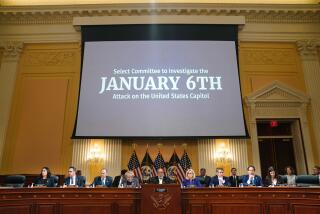White House panel recommends new limits on NSA surveillance
- Share via
WASHINGTON -- A presidential task force has urged the White House to adopt significant new curbs on the National Security Agency, including that the spy agency stop bulk collection of domestic telephone records and that the U.S. consider “no spying agreements” with close allies overseas.
The five-member panel said their 46 recommendations were designed to add transparency, accountability and oversight over the NSA, a secretive electronic spying agency that has operated in the shadows even as its ability to intercept Internet traffic and eavesdrop on other communications has burgeoned in recent years.
“What we’re saying is, ‘Just because we can, doesn’t mean we should,’” task force member Richard Clarke, a former counter terrorism advisor to President George W. Bush, told reporters at a briefing Wednesday.
Another task force member, Michael Morell, who recently retired as acting head of the CIA, said that none of the recommendations would diminish the intelligence community’s ability to collect the information it needs for counter-terrorism or other national security needs.
PHOTOS: 2013’s memorable political moments
President Obama appointed the blue-ribbon panel last August and their report marks the latest blow to the NSA, which has faced intense criticism since former contractor Edward Snowden began leaking a torrent of classified documents about long-secret NSA surveillance operations around the globe.
Earlier this week, a federal judge ruled that the NSA’s bulk collection of domestic telephone records, which Snowden revealed, probably violates the Constitution.
The White House officials said they will review the report in coming weeks, and Obama will announce in January which of the recommendations he will approve and which he won’t.
“It’s a substantive, lengthy report, and it merits serious review and assessment,” spokesman Jay Carney told reporters.
Obama won’t make any “snap judgments,” another aide said, but will review it over his Christmas vacation in Hawaii.
Among the most controversial recommendations comes in direct response to Snowden’s disclosure in that the NSA had secretly monitored communications of 35 foreign leaders, including German Chancellor Angela Merkel, a close American ally. Officials have said the program was on “autopilot” and not the subject of high-level discussions at the White House.
The report recommends a new process to approve such sensitive intelligence operations. It said officials should answer five questions before proposing to eavesdrop on a foreign leader, including whether that leader is suspected of lying to U.S. officials.
The White House already has disregarded one of the panel’s recommendations. The panel said the NSA and the Pentagon’s Cyber Command, which conducts offensive digital operations, should be given separate directors, instead of a single military commander with authority for both.
The White House announced last week it would continue the current practice of appointing the same commander for both posts when Gen. Keith Alexander, who currently holds the double-position, retires in coming months.
The report was released after a morning meeting between Obama and the five task force members in the Situation Room, officials said.
Follow Politics Now on Twitter and Facebook
Twitter: @cparsons
Twitter: @kendilanianLAT
More to Read
Sign up for Essential California
The most important California stories and recommendations in your inbox every morning.
You may occasionally receive promotional content from the Los Angeles Times.















